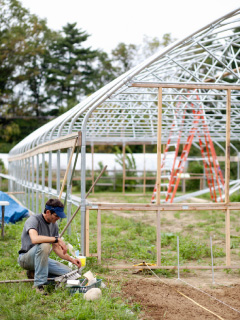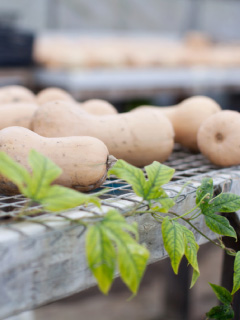 story by Shaun Brady | photo by Emily WrenOn spring, summer and fall afternoons, Pennypack Farm is the hot spot for local families. Parents gather at the Montgomery County nonprofit to examine the selection of crops laid out farmers market-style in the harvest house. Kids head straight for the U-Pick crops and start on rows of green beans, raspberries and other coveted produce. But fresh fruits and vegetables are not the only goodies these member families will return home with, says Margot Bradley, the administrative director and one of Pennypack’s founding members. “Every time somebody sets foot here, they’re going to learn something. We look at every visit to the farm as an education.”
story by Shaun Brady | photo by Emily WrenOn spring, summer and fall afternoons, Pennypack Farm is the hot spot for local families. Parents gather at the Montgomery County nonprofit to examine the selection of crops laid out farmers market-style in the harvest house. Kids head straight for the U-Pick crops and start on rows of green beans, raspberries and other coveted produce. But fresh fruits and vegetables are not the only goodies these member families will return home with, says Margot Bradley, the administrative director and one of Pennypack’s founding members. “Every time somebody sets foot here, they’re going to learn something. We look at every visit to the farm as an education.”
Pennypack’s suburban location in Horsham has been a key to fulfilling this mission. Convenient to Ambler, Fort Washington, Willow Grove and even Chestnut Hill, the 24-acre site, hosted by The College Settlement of Philadelphia, provides locals an opportunity to visit their food at its source without spending more precious time or gas money than they would on a trip to the supermarket.
Not Your Average CSA
“We don’t box up and deliver,” explains Bradley, drawing a distinction between what Pennypack offers and conventional CSAs (community-supported agriculture). “We get to do that because we’re right here in the ’burbs.”
For Bradley, the difference this makes comes with families not only eating healthier, but understanding where that healthy food comes from. “I like it when people really connect to the soil and realize just how much work it is to get your food,” she says, strolling through the farm on a chilly September afternoon. “I want them to know that strawberries are in June, they’re not now. I want them to know that there are predators and that when food is grown organically, sometimes it’s got some holes in it. I like it when they know the farmers and appreciate how much labor it is to harvest and wash.”
That knowledge comes firsthand at Pennypack, as each CSA member family is asked to contribute four hours of volunteer duty per season. With roughly 400 families receiving shares, that makes for a lot of amateur agriculture, which can prove a challenge to Pennypack’s full-time farm staff.
“You never know who you’re going to get,” laughs farm manager Katie Fotta. “Any time that you’re saying, ‘Come volunteer whenever you want to,’ you take whatever comes through the door. Sometimes we might get amazing work out of that person, sometimes it’s interesting to see how they’ve interpreted my instructions. Suddenly, there’s a bunch of turnips that aren’t there anymore. But as much as it’s a challenge, it’s at the same time so beautiful.”
An Unlikely Beginning
Pennypack Farm began in 2000 when Bradley and like-minded locals responded to a letter to the editor in the local Ambler Gazette newspaper touting the CSA concept. “There were 30 people…with lots of different interests,” she recalls. “Sustainability, eco-people, people like me who were just into organic food. And we decided we just plain wanted to see a farm like this happen here. We had no money, no farmer, and no land, but we were very persistent.”
 photo by Emily Wren
photo by Emily Wren
That persistence paid off when the Natural Lands Trust connected the group with The College Settlement, who owned the largest tract of open space in Eastern Montgomery County and wanted to promote community-based farming on the land. The lease was formalized in 2003, when Pennypack’s 11-member board of directors was formed, a farm manager was hired, and the farm was chartered as an educational nonprofit corporation.
The program has expanded exponentially over nine growing seasons; now the waiting list for a summer/fall CSA share numbers 600 names. A recently-initiated college-age internship program last year boasted 22 applications for three positions. What was at the time nothing but “unrelenting field corn” is now 15 cultivated acres, and there’s hope of doubling the acreage with more land in the area.
Pennypack’s ongoing evolution and the board’s dogged fundraising is apparent all over the farm. “We’re continually working on figuring out the best way of doing things here with the equipment that we have,” says Andy Andrews, Pennypack’s farm director. “Hopefully we’re getting a little bit better at it each year.”
One example is the farm’s latest innovation—a movable hoophouse. The metal, plastic-paned frame built on a roller and track system essentially allows for cover over successive patches of crops, with the ability to easily shift the covered area to speed crop rotation. “You can’t do that in a typical greenhouse,” explains Andrews. “We typically plant the same thing in the winter and in the summer, and we can’t give that land a break. This way we have three possible spaces. There’s lots of advantages to this thing.”
The Learning Curve
Across a pathway from the new hoophouse is Pennypack’s “edible classroom,” a microcosm of a farm where children’s educational programs are held. Here, farm educator Raina Ainslie helps kids plant and tend their own crops, and leads farm-centric lessons, like teaching students to dance like bees to guide their classmates to hidden items. Education happens off the farm as well. Pennypack holds cooking and knife skills lessons for teens in the nearby kitchen of a local church. And at times, the kids aren’t the only ones learning.
“When I first started doing education programs here, a lot of the parents who brought their children were very much into CSAs and understood what that meant for them, their family and their community,” says Ainslie. “But as time went on, we had more families coming that didn’t really understand food. There were a lot more parents that were learning just as much as the kids. I enjoyed the fact that we were reaching further into the community.”
Families arriving for their CSA shares all had stories of how coming to Pennypack changed their families’ approach to eating. “I had been trying to find a way to get more fresh and local food into our diets,” said Socorro Rivas, a volunteer greeter in the harvest house. “Now we have a lot more access to fresh and organic vegetables, which our budget wouldn’t permit us before. And my girls come here, they know exactly where their food is coming from, and at home when it’s time to eat there’s no ‘I don’t want to eat my veggies.’ We’ve gone from being a conventional packaged-food type of family to making almost everything from scratch. It’s changed everyone’s health for the better.”
Mary Tobkin, an internal medicine doctor at Abington Memorial Hospital who also serves on Pennypack’s board, has seen her own practice impacted by spending time at the farm. “I didn’t know what a Jerusalem artichoke was,” she says, referring to the time it showed up in her CSA share. “I often challenge people who are vegetable-inhibited to go to a grocery store every week, buy something new and figure out what to do with it. I got that from the way you live here.”



